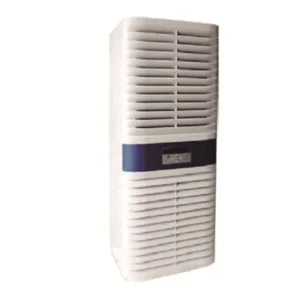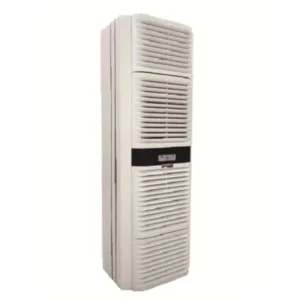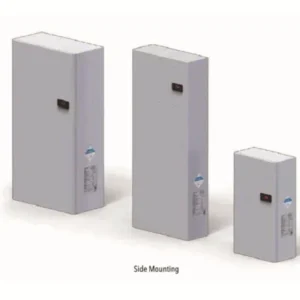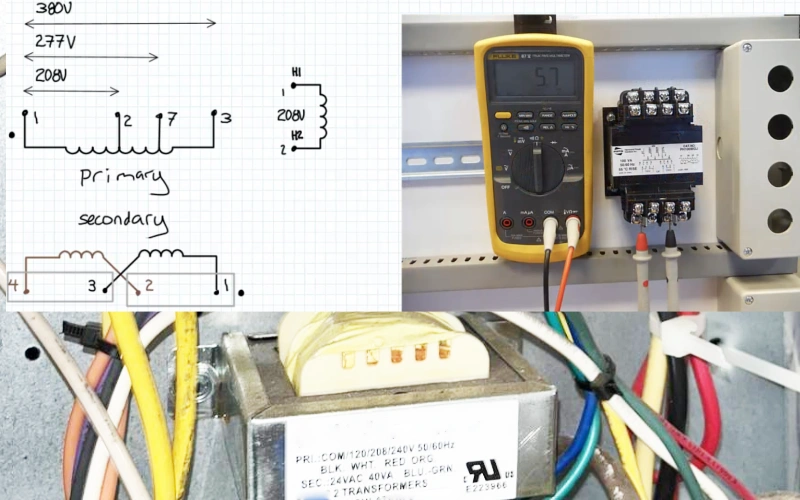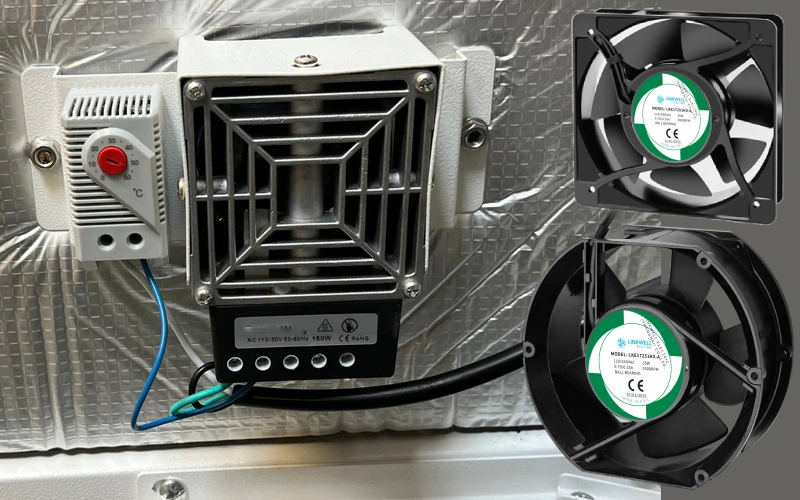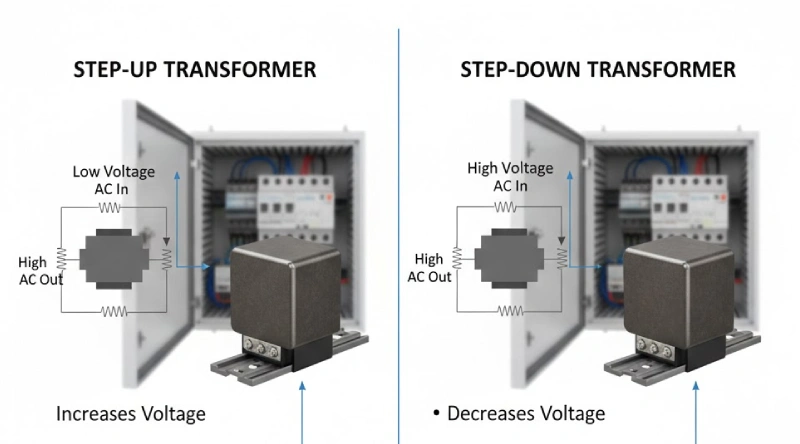When you look at Chiller Based Cooling vs Compressor Based Cooling, the main difference comes from how each system controls heat inside your enclosure. Compressor-based cabinet air conditioners use a vapor-compression cycle to keep things cool right where you need it. Chiller systems rely on circulating chilled water or coolant through a network. Cooling efficiency matters a lot for your equipment. If you let heat build up, you risk shortening component lifespan and causing unexpected failures.
- Excess heat forces components to work harder, leading to premature failures.
- Effective cooling prevents thermal stress and helps your system run longer.
- Good airflow and heat management keep your enclosure reliable.
Linkwell offers advanced cabinet air conditioners that stand up to tough environments and help protect your investment.
Key Takeaways
- Compressor-based cabinet air conditioners provide efficient cooling for sensitive electronics, preventing overheating and extending component lifespan.
- Regular maintenance of cooling systems is crucial. Simple tasks like cleaning filters can prevent unexpected downtime and costly repairs.
- Linkwell cabinet air conditioners are designed for tough environments, offering features like energy efficiency and easy installation for various applications.
- Choosing the right cooling system depends on your specific needs. Consider factors like application size, maintenance requirements, and environmental conditions.
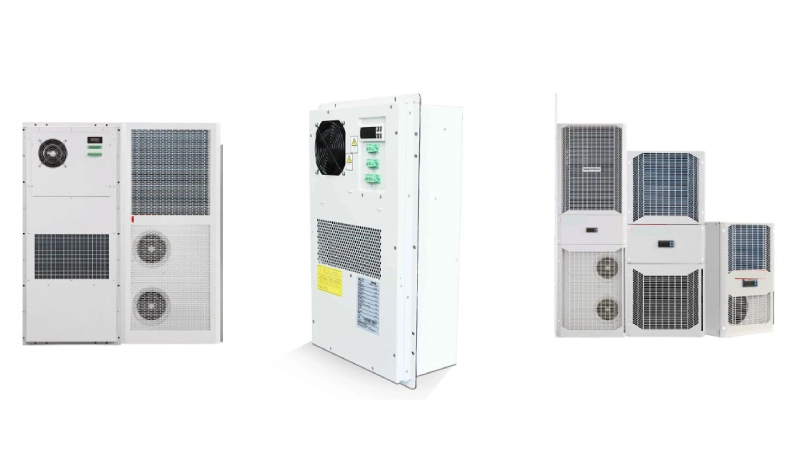
Compressor-Based Cooling Application: Cabinet Air Conditioners Overview
What Are Cabinet Air Conditioners?
If you work with electrical cabinets or control panels, you know how important it is to keep everything inside at the right temperature. Cabinet air conditioners are special devices designed to provide reliable cooling for sensitive electronics. These units help you avoid problems caused by overheating, moisture, and dust. When you install a cabinet air conditioner, you create a safe environment for your equipment, even in tough industrial settings.
Recommended products
Here’s a quick look at what these systems do for you:
| Function | Description |
|---|---|
| Temperature Regulation | Maintains optimal temperature within electrical cabinets to prevent overheating of sensitive components. |
| Humidity Control | Helps in controlling humidity levels to protect electronics from moisture-related damage. |
| Contaminant Protection | Creates a positive pressure environment to prevent dust and dirt from entering the cabinet. |
| Safety Assurance | Minimizes risks of electrical fires by maintaining safe operating temperatures. |
| Longevity of Components | Ensures smooth functioning and longevity of electrical components by preventing overheating. |
| Advanced Cooling Mechanisms | Utilizes fans and air filters to dissipate heat and block contaminants, respectively. |
You can see that cooling is not just about lowering the temperature. It’s about protecting your investment and making sure your systems run smoothly. Cabinet air conditioners use advanced cooling technology to keep your electronics safe from heat, humidity, and airborne particles.
Linkwell Cabinet Air Conditioner Features
When you choose Linkwell, you get more than just basic cooling. Linkwell cabinet air conditioners come packed with features that make them stand out in the market. You get robust cooling performance, energy efficiency, and easy installation options. These units work well in both indoor and outdoor environments, so you can rely on them for a wide range of applications.
Linkwell’s cabinet air conditioners meet strict industry standards. Here’s a quick overview of the certifications you can count on:
| Certification/Standard | Description |
|---|---|
| CE | Compliance with European safety standards |
| RoHS | Restriction of hazardous substances |
| ISO9001 | Quality management systems standard |
| UL | Underwriters Laboratories safety certification |
You can use Linkwell cooling solutions in places like wind power stations, photovoltaic power plants, energy storage sites, and automated factories. The units offer IP54/IP65 protection, inverter technology, and smart digital controls. This means you get reliable cooling, even in dusty or humid environments. With Linkwell, you protect your sensitive electronics and keep your operations running without interruption.
Tip: Regular cooling maintenance helps you avoid unexpected downtime and extends the life of your equipment.
Thermoelectric Cooling (TEC) Technology – How TEC Cabinet Air Conditioners Work
Thermoelectric Cooling (TEC) technology is an innovative, solid-state method of controlling temperature without the need for compressors, refrigerants, or moving parts. At the heart of this system is the Peltier effect, where an electric current passed through a thermoelectric module creates a temperature difference. One side absorbs heat and becomes cold, while the other side releases heat and becomes hot. By channeling this effect, TEC cabinet air conditioners provide reliable cooling for enclosures that protect sensitive electronics and electrical components.
Here’s how they work: when powered, the TEC module pulls heat away from the inside of the cabinet and transfers it to the external environment. Integrated heat sinks and fans assist in dispersing the heat efficiently. Unlike traditional compressor-based systems, TEC units are compact, lightweight, vibration-free, and require very little maintenance. They’re also eco-friendly, since no harmful refrigerants are involved.
These cabinet air conditioners are especially useful in industries where space is limited and precision cooling is essential—such as telecommunications, automation, medical equipment, and military electronics. By maintaining stable temperatures, TEC cabinet air conditioners prevent overheating, reduce downtime, and extend the lifespan of critical equipment, ensuring safe and efficient operations.
Compressor Cooling Technology
How Compressors Work
You might wonder how compressor-based coolers keep your cabinet at the perfect temperature. The secret lies in the vapor compression chillers process. This cooling technology uses compressors to move heat out of your enclosure. Here’s how the cycle works:
| Step | Description |
|---|---|
| 1 | The compressor compresses low-temperature, low-pressure refrigerant gas into high-temperature, high-pressure gas. |
| 2 | The high-pressure gas enters the condenser, releasing heat and condensing into a liquid. |
| 3 | The liquid refrigerant passes through an expansion valve into the evaporator, where it evaporates and absorbs heat from the cabinet’s interior. |
This process repeats, so compressor-based coolers constantly remove heat from your cabinet. Compressors play a key role in this cooling technology. They push refrigerant through the system, making sure your electronics stay safe. You get reliable cooling, even when the environment gets tough. Vapor compression chillers are popular because they work fast and keep temperatures steady.
Linkwell Compressor-Based Cooling Advantages
When you choose Linkwell compressor-based coolers, you get more than just basic cooling technology. These coolers use advanced compressors and smart features to boost performance. You save energy with inverter compressors and EC fans. You also get digital controls and remote monitoring, making operation simple.
Here are some reasons why Linkwell compressor-based coolers stand out:
- High energy efficiency from inverter compressors and EC fans.
- Advanced digital controls for easy operation and remote monitoring.
- IP54/IP65 and NEMA 4 ratings protect against water and dust.
- Unique condenser management system evaporates condensed water inside, preventing leaks.
- Compact, ultra-thin design makes installation and maintenance easy.
- Versatile mounting options fit top, side, or wall enclosures.
- UL, CE, RoHS, and ISO 9001 certifications guarantee global reliability.
Linkwell compressor-based coolers use variable-speed compressors. These compressors adjust speed based on cooling demand, saving energy and reducing wear. Fixed-speed compressors run constantly, which can use more energy and wear out faster. With sealed compressor-based coolers, you protect sensitive electronics from dust and moisture. This cooling technology keeps your equipment running longer.
You also benefit from the latest advancements in compressor-based coolers. Linkwell uses high-efficiency components, smart sensors, and low GWP refrigerants. These features make compressor-based coolers more reliable and eco-friendly. You get cooling technology that adapts to your needs and saves energy.
Tip: If you want a cooler that’s easy to install, saves energy, and keeps your electronics safe, compressor-based coolers from Linkwell are a smart choice.
Chillers and Chiller Based Cooling
How Chillers Work
You might wonder how chillers keep things cool in big industrial settings. Chillers use a refrigeration cycle to remove heat from water or coolant. This chilled liquid then flows through pipes and absorbs heat from machinery, processes, or spaces. You get a steady way to control temperature, which is important for many industries.
There are two main types of chillers you’ll see: water-cooled and air-cooled. Water-cooled chillers use water and cooling towers to get rid of heat. Air-cooled chillers use fans and air to do the same job. Each type has its own strengths.
Here’s a quick look at how chillers work:
| Step | What Happens |
|---|---|
| 1 | Chillers pump refrigerant through a compressor. |
| 2 | The refrigerant moves to a condenser, where it releases heat. |
| 3 | The cooled refrigerant goes through an expansion valve. |
| 4 | It enters the evaporator, where it absorbs heat from the water or coolant. |
| 5 | The chilled water or coolant circulates to cool equipment or spaces. |
You can see chillers in action in places like food production, pharmaceuticals, petrochemicals, plastics, and metal plating. Chillers help keep machines safe and products high quality.
Chiller System Benefits
Chillers offer some big advantages when you need reliable cooling for large operations. You get precise temperature control, which is key for industries like healthcare, food, and pharmaceuticals. Chillers can handle huge cooling loads, so they fit well in factories and plants.
Let’s break down the benefits:
- Precise temperature control keeps products safe and machines running smoothly.
- Energy efficiency helps you save on electricity bills, especially with modern screw chillers.
- Scalability means you can add more chillers as your business grows.
- Chillers use eco-friendly refrigerants, helping you meet environmental rules.
- Water-cooled chillers work well for large capacities and run quietly.
- Air-cooled chillers are easier to maintain and install, though they may use more energy and make more noise.
You’ll find chillers in industries where heat builds up fast. They keep things cool in agriculture, food processing, and chemical plants. Chillers help you avoid overheating, downtime, and costly repairs.
Tip: If you run a big operation, chillers give you the flexibility and control you need to keep everything safe and efficient.
Chiller Based Cooling vs Compressor Based Cooling
Efficiency Comparison
When you compare chiller based cooling vs compressor based cooling, you want to know which system gives you the most efficient cooling for your enclosure. Efficiency matters because it affects your energy consumption and operating costs. You want a system that keeps your equipment safe without wasting energy.
Let’s break down the numbers. Compressor-based cabinet air conditioners usually have a coefficient of performance (COP) between 3.5 and 5. Absorption chillers often have a COP less than 1. That means compressor-based systems deliver more cooling for every unit of energy they use.
| System Type | Average COP Value |
|---|---|
| Compressor-based Air Conditioners | 3.5 to 5 |
| Absorption Chillers | Less than 1 |
Water-cooled chiller systems can reach even higher efficiency, especially in large-scale setups. For example, the COP for water-cooling systems can be around 5.12 in summer, while air-cooling systems reach about 3.77. You see better performance and lower energy consumption with water-cooled chillers, but compressor-based cabinet air conditioners offer efficient cooling for smaller enclosures.
You also need to think about environmental impact. Compressor-based systems use refrigerants, and some older types can contribute to greenhouse gas emissions. Newer models, like those from Linkwell, use low-GWP refrigerants and advanced inverter technology to boost efficiency and reduce energy consumption. Chiller systems, especially water-cooled ones, may use a lot of water, so you need to consider water recycling and treatment to minimize environmental risks.
Note: Linkwell cabinet air conditioners meet strict energy efficiency standards and use eco-friendly refrigerants, helping you stay compliant with regulations and reduce your carbon footprint.
Cooling Capacity and Performance
Cooling capacity tells you how much heat a system can remove from your enclosure. You want a system that matches your needs, whether you have a small control cabinet or a large industrial panel.
Here’s a quick comparison:
| Feature | Compressor-Based | Thermoelectric (TEC) |
|---|---|---|
| Cooling Capacity | High | Low to Medium |
| Application Size | Medium to large enclosures | Small to medium enclosures |
Compressor-based cabinet air conditioners deliver high cooling capacity, making them ideal for medium to large enclosures. Chiller systems shine in large-scale applications, like factories or data centers, where you need to cool multiple cabinets or entire rooms. In real-world tests, compressor-based air conditioners can provide cooling power up to 260W, while thermoelectric coolers reach about 250W. Under actual conditions, their performance is similar, but compressor-based units handle higher loads more efficiently.
Performance depends on more than just cooling capacity. Environmental factors like ambient temperature and humidity play a big role. High temperatures can strain compressors and lower efficiency. High humidity can cause corrosion and damage electrical parts. You want a system that maintains stable performance, even when conditions change.
| Environmental Factor | Impact on Performance |
|---|---|
| Ambient Temperature | Determines the type of cooling system required; high temperatures necessitate active cooling systems like compressors. |
| Humidity | Affects the efficiency and lifespan of cooling systems; high humidity can lead to corrosion and damage. |
Linkwell cabinet air conditioners use smart digital controls and inverter compressors to adapt to changing conditions. You get reliable performance and efficient cooling, even in harsh environments. Chiller systems also offer strong performance, especially in large facilities, but they require more infrastructure and maintenance.
Tip: For most electrical enclosures, compressor-based cabinet air conditioners give you the best balance of cooling capacity, performance, and energy consumption.
Maintenance and Longevity
You want your cooling system to last and require minimal maintenance. Let’s look at how chiller based cooling vs compressor based cooling stack up.
Compressor-based cabinet air conditioners, like those from Linkwell, are designed for easy installation and low maintenance. You need to clean filters and check for leaks, but most units run for years with little trouble. Advanced models use sealed systems to keep dust and moisture out, which helps extend the lifespan of your equipment.
Chiller systems need more attention. You must monitor water quality, check pumps, and maintain cooling towers. Water-cooled chillers can consume a lot of water, so you need recycling systems to keep costs down. If you skip maintenance, you risk corrosion, scale buildup, and reduced performance.
Environmental conditions affect longevity. High temperatures and humidity can shorten the life of compressors and chillers. Regular maintenance helps you avoid breakdowns and keeps your cooling system running smoothly.
Here’s a quick checklist for maintenance:
- Clean filters and inspect for debris.
- Check refrigerant levels and look for leaks.
- Monitor water quality in chiller systems.
- Inspect electrical connections and controls.
- Schedule regular service to catch problems early.
Linkwell cabinet air conditioners offer robust construction and smart controls, making them a reliable choice for demanding environments. You get efficient cooling, strong performance, and long-lasting protection for your electronics.
Tip: Choose a cooling system that matches your maintenance resources and application needs. Linkwell’s cabinet air conditioners make maintenance simple and help you avoid costly downtime.
Application Scenarios
When to Choose Compressors
You want a solution that fits your specific applications. Compressor-based cabinet air conditioners work best for many industrial applications. You see these units in factories, oil refineries, steel plants, hospitals, labs, data centers, and commercial buildings. They handle tough environments and keep your equipment safe. If your applications involve high heat, dust, or humidity, compressor-based cooling gives you reliable protection.
Here’s a quick table showing where compressor-based cabinet air conditioners shine:
| Application Scenario | Description |
|---|---|
| Industrial Sites | Keeps machines cool and safe for efficient operations. |
| Oil Drilling and Refineries | Protects control panels from overheating and damage. |
| Steel and Metal Factories | Maintains equipment performance in high-heat areas. |
| Hospitals and Labs | Ensures clean and safe tools and equipment. |
| Data Centers and Server Rooms | Handles strong electrical loads and cooling demands. |
| Urban Commercial Buildings | Meets rising cooling needs in cities. |
| Textile Factories | Provides steady cooling in changing conditions. |
| Recycling Centers | Maintains efficiency by keeping temperatures optimal. |
Linkwell cabinet air conditioners stand out in these applications. You get dust and moisture resistance, uninterrupted operation, and reliable cooling even in extreme heat or humidity. That means your applications run smoothly and your equipment lasts longer.
When to Choose Chillers
Some applications need a different approach. Chiller-based cooling systems work well for large-scale applications or places with special requirements. If your applications cover big areas or need centralized cooling, chillers offer strong performance. Water-cooled chillers deliver high efficiency but need a steady water supply. Air-cooled chillers fit applications where water is limited. You see chillers in commercial buildings, factories, and regions with water shortages.
Consider chillers for these applications:
- Large facilities with high cooling loads
- Applications needing centralized cooling
- Environments with limited water (air-cooled chillers)
- Places where energy efficiency is a top priority
Chillers adapt to many applications and offer scalable cooling solutions.
Factors for Selection
Choosing the right cooling system for your applications depends on several factors. You want to match your cooling needs with the right technology. Here’s a table to help you decide:
| Factor | Description |
|---|---|
| Noise Levels | Pick low-noise compressors for sensitive applications. |
| Ease of Installation | Look for plug-and-play designs for quick setup. |
| Maintenance Requirements | Choose systems with easy access for cleaning and repairs. |
| Reliability | Check for high IP ratings and durable materials for harsh applications. |
| Customization Options | Find suppliers who offer tailored solutions for unique applications. |
| Supplier Partnership | Work with experts who support your applications and provide fast help. |
Linkwell cabinet air conditioners meet these needs for demanding applications. You get high efficiency, easy installation, and strong reliability. Your applications stay protected, and you avoid costly downtime.
Tip: Always match your cooling system to your applications. Linkwell offers solutions built for harsh environments and complex applications.
When you compare cooling systems, you see clear differences. Compressor-based cabinet air conditioners give you targeted cooling for electrical enclosures. Chiller systems handle large-scale cooling with water or air-cooled options. You get better cooling efficiency with variable speed compressors, saving up to 25.9% energy. Chiller systems work best for big cooling loads but need more space and maintenance.
- You want cooling that matches your application.
- Linkwell offers cabinet air conditioners with smart cooling controls and energy-saving features.
| Chiller Type | Pros for Cooling | Cons for Cooling |
|---|---|---|
| Water Cooled | Efficient cooling, large loads | Needs water, higher costs |
| Air Cooled | Simple cooling, less space | Shorter life, more noise |
You can trust Linkwell for reliable cooling in tough environments. Check your cooling needs and choose the right cooling solution for your business.
FAQ
How do I choose between a compressor-based cabinet air conditioner and a chiller system?
You should look at your cooling needs, space, and budget. Compressor-based units work best for single enclosures. Chiller systems fit large facilities. If you want easy installation and low maintenance, go with a cabinet air conditioner.
Can I install a Linkwell cabinet air conditioner outdoors?
Yes, you can. Linkwell offers models with IP54/IP65 and NEMA 4 ratings. These units handle dust, rain, and harsh weather. You get reliable cooling for outdoor electrical cabinets.
What maintenance does a cabinet air conditioner need?
You need to clean the filters and check for leaks. Inspect the unit for dust or debris. Regular maintenance keeps your system running smoothly and extends its lifespan.
Are Linkwell cabinet air conditioners energy efficient?
Absolutely! Linkwell uses inverter compressors and EC fans. These features help you save power and lower your operating costs. You get efficient cooling without wasting energy.
Can I monitor my cabinet air conditioner remotely?
Yes, you can. Many Linkwell models support digital controllers and Modbus integration. You get alarm outputs and remote monitoring. This makes it easy to manage your cooling system from anywhere.


